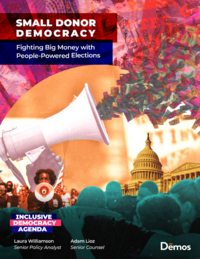Executive Summary
Everyone, regardless of their race, income, or gender, deserves to have a voice in our political system and a say in how our government runs. Our democracy is strongest when a broad and representative swath of people participates by organizing, protesting, voting, and donating. Small contributions from everyday people to candidates and causes are a core element of a thriving democracy.
Yet today, the strength of our voice in society is often determined not by the power of our ideas but by the size of our wallets. The unlimited big money that plagues our politics means our election officials too often prioritize the voices and demands of a wealthy, overwhelmingly white, and disproportionately male donor class over those of ordinary people.
The result? Elected officials who do not reflect the faces or needs of our communities, and policies that do not address the priorities of the majority of Americans, especially those of Black and brown Americans.
At Demos, we and our grassroots partners have been working for years to build up the power of everyday people in our democracy through small donor public financing of elections. Most recently, we’re getting creative about strategies for democratizing the influence of money in our political system and building the political power of Black and brown people in particular. In our latest policy brief, we imagine how we can –
- End the conflation of democratic entities like labor unions and other membership groups with profit-driven corporations in campaign finance law, and limit for-profit corporations ability to spend immense sums to influence elections.
- Adjust how we regulate labor unions and other membership groups’ efforts to organize small donors.
- Design matching systems for small-donor public financing for elections programs that match contributions to candidates mobilized through membership and other grassroots groups.
- Establish small-donor PACs, which may only accept small-dollar contributions but are permitted to give larger contributions to candidates or parties, and make these funds available to publicly-financed candidates.
When people come together around shared identities or issues we care about, we can build strength in numbers and speak with a louder, more powerful collective voice. As our elections are more and more flooded with big money, we must adapt our existing campaign finance system to empower everyday people—especially the communities of color, women of all races, working-class people, and youth who have been marginalized for so long—and support grassroots groups’ ability to leverage the proper currency in our democracy: political power through numbers.

